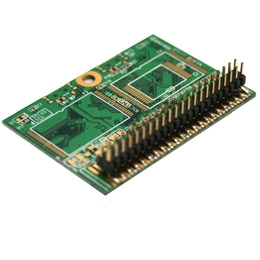Note: The difference between Single Channel and Dual Channel impact on the speed only, where the Dual Channel offer twice the read/write transfer speed performance compared to the single channel, since they are made of 2 chips that can be accessed simultaneously. This does not affect the compatibility and both models will be similarly recognised by the motherboard..
Embedded Disk Card 4000 (EDC4000) products provide high capacity solid-state flash memory that electrically complies with the Personal Computer Memory Card International Association ATA standard. InnoDisk Embedded Disk Card 4000 (EDC4000) is embedded solid-state data storage systems for industrial work place. Embedded Disk Card 4000 (EDC4000) features an extremely light weight, reliable, low-profile form factor.
Embedded Disk Card 4000 (EDC4000) supports advanced PIO (0-4), Multi Word DMA (0-2), Ultra DMA (0-4) transfer modes, multi-sector transfers, and LBA addressing.
interface 40pin or 44pin IDE/ATA
Drive Config. Jumper Switch Master/Slave
IDE Transfer Mode PIO mode 0-4/ MwDMA mode 0-2/UDMA mode 0-4
Burst Speed Rate 66.6MB/sec.
Operation Temp -100C~+700C(Standard)
-400C~+850C(Industrial)
Storage Temp -550C~+950C
Humidity 100C~950C non-condensing
Vibration 5G(7~2000Hz)
Shock 50G/10ms
ECC Technology High reliability base on the internal ECC function
MTBF >3,000,000 hours
R/W Endurance 2,000,000 times
DC Input Voltage +3.3V~+5V single power supply operation
Power Mode Auto stand-by mode
Support PIO mode0-4/MwDMA 0-2/UDMA 0-4,
Dual Channel Performance:
Sustained Read : 40MB/sec
Sustained Write : 20MB/sec
Single Channel Performance:
Sustained Read : 20MB/sec
Sustained Write : 10MB/sec
Note: Single Channel and Dual Channel configuration is only a memory configuration and does not affect compatibily with the standards. The only difference between the 2 configurations is the performance
| Reliability |
Test conditions |
Reference Standards |
| Vibration |
7 Hz to 700 Hz, 2 g, 3 axes |
IEC 68-2-6 |
| Mechanical Shock |
Duration: 0.5ms, 1500 g, 3 axes |
IEC 68-2-27 |
| Unit Drop |
From a height of 1.5 m |
IEC 68-2-32 |
Conditions:
Telcordia SR-332 GB, 250C,
> 3,000,000 Hours
Read Cycles: Unlimited Read Cycles.
Write /Erase Cycles: 2,000,000 Erase Cycles.
>150 years @ 50GB write-erase /day
Data Retention: 10 years.
Wear-Leveling Algorithm: support.
Bad Blocks Management: Support
Error Correct Code: Support
Operating Temperature Range:
- Standard Grade: -100C to +700C
Storage Temperature Range:
- Standard Grade: -450C to +950C
Flash memory can be erased a limited number of times. This number is called the erase cycle limit or write
endurance limit and is defined by the flash array vendor. The erase cycle limit applies to each individual erase
block in the flash device.
EDC4000 uses a wear-leveling algorithm to ensure that consecutive writes of a specific sector are not written
physically to the same page in the flash. This spreads flash media usage evenly across all pages, thereby
maximizing flash lifetime.

|

 Also available in Vertical Format
Also available in Vertical Format